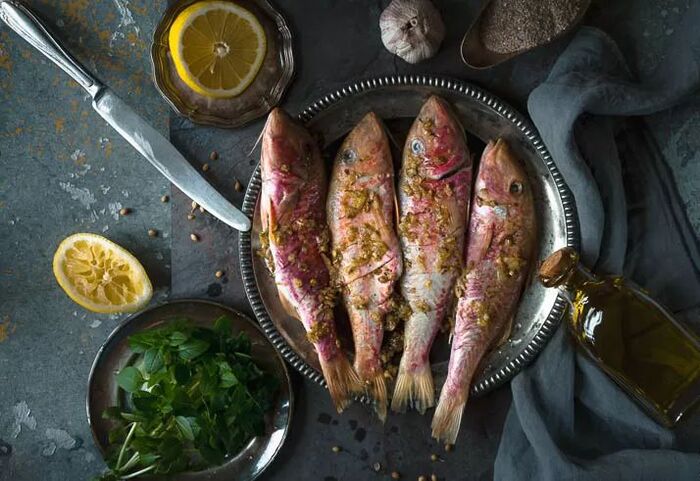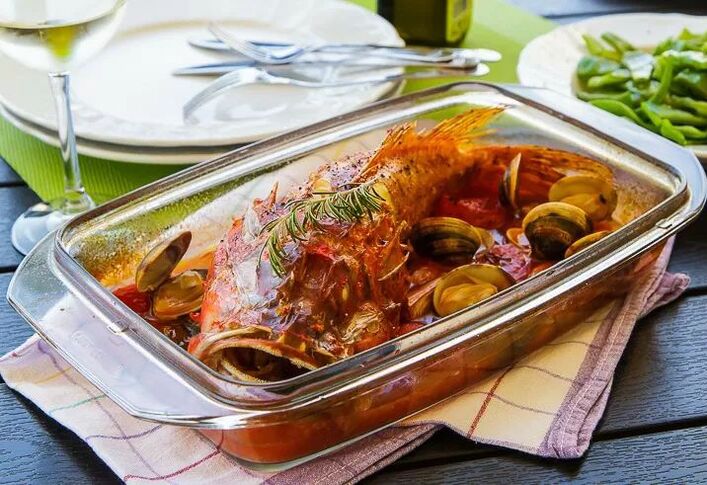Everyone has heard about the benefits of the Mediterranean diet. This term first appeared in the middle of the last century, when researchers found many similarities in the diet and lifestyle of the inhabitants of the countries of the Mediterranean region, and associated this with the longevity and health for which they are famous.
Since then, the Mediterranean diet has been closely studied around the world, both by experts and people who want to build a healthy and balanced diet to live a long and happy life. What are the principles of the Mediterranean diet and how to create a menu in accordance with them, if you live not in Palermo, but in other cities, read below.

The main rules of the Mediterranean diet
Today, the Mediterranean diet is a consolidated concept that is based on the eating habits of the inhabitants of the Mediterranean coast. These habits have been analyzed and compiled into a convenient system that anyone can follow. Briefly, the principles of the Mediterranean diet are as follows:
- High intake of monounsaturated fats.Olive oil and other sources of monounsaturated fatty acids are widely used in cooking, providing up to a third of all calories.
- Low level of meat consumption.Traditionally, meat in Mediterranean countries was consumed on special occasions and not every day.
- High consumption of fish and seafood.Marine sources of protein in the Mediterranean diet play the role of a kind of meat substitute, which is why they are consumed quite often.
- High consumption of vegetables, fruits, legumes, nuts, whole grains.Vegetable and vegetarian dishes owe their permanent place on the Mediterranean table to the good climate, and the most common dessert is fresh fruit.
- Average level of dairy consumption.The main dairy product consumed in Mediterranean countries is cheese, it is no coincidence that the largest number of cheeses in the world are found here.
- Average level of alcohol consumption.Residents of the Mediterranean tend to drink regularly, but in small quantities. It's usually a glass or two of wine at lunch and dinner.
- Physical activity.Although this item is not directly related to food, residents of Mediterranean countries tend to lead an active lifestyle, spending a lot of time outdoors.
Taking these rules into account when creating your daily menu, you will be able to adhere to the Mediterranean diet, regardless of where you live. What will this give? Fortunately, today there is more than enough research on this diet, so we can say with confidence.

Benefits of the Mediterranean diet
So, the Mediterranean diet:
- promotes the functioning of blood vessels, reducing the risk of cardiovascular diseases;
- prevents inflammatory processes and restores damaged cells;
- reduces the risk of cancer, as well as diseases such as diabetes, asthma, Alzheimer's disease and others;
Based on the general principles of the Mediterranean diet, the WHO developed dietary guidelines to reduce the risk of cardiovascular disease and, in 2010, UNESCO recognized the Mediterranean diet as national cultural heritage.
Spanish scientists from the University of Las Palmas de Gran Canaria and the University of Navarra went even further, studying 11, 000 people and found that those who most carefully followed the above principles of the Mediterranean diet had a 30% lower risk of depression than the rest. The reasons for this, however, are not entirely clear, but scientists have suggested that the reduced risk of depression is one of the consequences of the fact that foods included in the Mediterranean diet improve vascular function and fight inflammation.

If you want to start but don't know how
The benefits that the Mediterranean diet promises make your head spin. Of course, there is hardly anyone who would not agree to reduce the risk of certain diseases, but it is very difficult to change your diet all at once, especially if you have never done it before. Therefore, below I will give some tips and recommendations for those who want to start eating according to the Mediterranean diet, and at the end of the article I will make a trial menu for the week so that the first step towards a new life is not so scary.
Here's what you should do first:
Buy olive oil
No, I have no doubt that you eat cold pressed olive oil without my advice, but if you don't have it in the kitchen at least sometimes (or, on the contrary, the same bottle of olive oil has been gathering dust in the cupboard for more than two, maximum three months), you can forget about the Mediterranean diet. Dress salads with olive oil, pour over fresh and cooked vegetables, pasta, cereals, fish and dip bread. Good olive oil is a versatile seasoning that goes with literally everything, so the secret here is to get into the habit. But frying in expensive, good-quality oil is only worth it when you cook over low heat, in other cases, use refined vegetable or butter.
Eat olives
Everything is clear here. Olive oil is made from olives, and the olives themselves also contain monounsaturated fatty acids that make it so healthy. Eating seven olives a day is enough to obtain all the nutrients they contain. Fortunately, the difficulties with this are few, most adults love olives, but if this statement does not apply to you, add olives to salads, sauces, stews or fresh cheeses.
Eat more fish
Forget the outdated recommendations that you should eat fish at least once a week. You should eat fish much more often - at least 3-4 times a week, which means you should improve your skills in choosing, purchasing and preparing fish. When choosing between sea and river fish, give preference to sea fish; between wild and caged fish, choose wild fish. Frozen fish, if defrosted correctly, is not much worse than fresh fish, but it is much more affordable, and the fish dish recipes on this site will last you a year ahead.
More vegetables, good and different
In the minds of many compatriots, vegetables are a salad or a side dish, and this idea needs to be urgently changed. Make it a habit to prepare one or two dinners a week entirely with vegetables and legumes. I'm not advocating going plant-based—adding cheese or a little ham is fine—but once you unlock the potential of vegetables as food, you'll begin to enjoy them. It would be nice, of course, if they were fresh, seasonal vegetables, but in winter our pickles and pickles fit perfectly into the Mediterranean diet. Is it in vain that they contain so many useful substances and vitamin C?. .
Pasta is good
We have a biased attitude towards pasta: at best they are considered a side dish, and at worst a source of problems for the figure. At the same time, in one of the countries that gave us the Mediterranean diet, Italy, pasta is considered the pillar of local cuisine: it is served before the main course, after the cold appetizers, which are called antipasti, that is, "before pasta "There's no point in exhausting yourself eating three or four-course dinners every day - it hasn't been done that for a long time, even in Italy itself. But it's worth discovering pasta as a complete dish. You can start with recipes for classic Italian sauces, giving preference to durum wheat pasta: they contain more nutrients and are better digestible.

Eat less sweets
If you can't imagine a day without a sweet roll or cake, you're going to have a hard time. In the Mediterranean diet, dessert is often replaced with fresh fruits and berries, which contain fiber and a number of vitamins and nutrients. The good news is that you can eat fruit in reasonable quantities every day, but if you can't live without it, it's best to reduce your consumption of other sweets to once or twice a week. And of course, we're not talking about store-bought baked goods with tons of sugar and margarine.
Mediterranean diet: menu for the week
As I promised, a bonus of the article will be a menu for the week, created according to the principles of the Mediterranean diet, but first some necessary explanations.
- Firstly, the combinations of appetizers and main dishes are given based on my subjective ideas about good cuisine, there is no hidden logic and, if desired, the dishes listed in the menu can be shuffled as you wish.
- Secondly, the menu is designed for a person who works 7 days a week, who only dines at home on weekends. If this does not apply to you, shuffle the dishes from the proposed menu in the same way or cook in reserve.
- Thirdly, the menu is not tied to any specific station. If some of the products needed for the suggested recipes are not currently available, you can - well, you get the idea! — shuffle the menu according to seasonality.
- Fourthly, do not be surprised if you see dishes on the menu that at first glance do not correspond to your ideas about the diet of Mediterranean residents. In Italy, many people are unlikely to eat cottage cheese and cream for breakfast – and yet these products fit perfectly into the Mediterranean diet.
- Finally, if you want to replace a dish or expand the proposed menu, study the recipe catalog.

Monday
Breakfast:
cottage cheese with sour cream
To have lunch:
fresh beetroot salad
fried cod and spinach sautéed quickly
seasonal fruits or berries
Tuesday
Breakfast:
natural yogurt with honey or jam
To have lunch:
lentil soup
oven-baked chicken cucumber and cucumber and herb salad
seasonal fruits or berries
Wednesday
Breakfast:
cottage cheese with sour cream
To have lunch:
toast with roasted peppers and cheese
fish and rice with vegetables
seasonal fruits or berries
Thursday
Breakfast:
Sugar-free muesli with yogurt
To have lunch:
Minestrone soup
spaghetti with cherry tomatoes and basil
seasonal fruits or berries
Friday
Breakfast:
natural yogurt with honey or jam
To have lunch:
salad with squid and fennel
Beef ribs with pepper sauce and grilled vegetables
seasonal fruits or berries
Saturday
Breakfast:
Shakshuka
To have lunch:
sea fish soup
squid baked with tomato
To have lunch:
Caprese salad
lamb with eggplant and bulgur with peas
figs with honey and rosemary
Sunday
Breakfast:
homemade cupcake
To have lunch:
roasted pepper soup
amatriciana spaghetti
To have lunch:
fried shrimp with garlic
oven-baked sole and potatoes with rosemary
Roast apple

Finally
Many of us associate the word "diet" with a constant feeling of hunger and the need to limit ourselves in our desires for the sake of some ephemeral result. But the Mediterranean diet is completely different. Where, if not in Mediterranean countries, do you know so much about good food and the pleasure that comes from a tasty and relaxed lunch that brings the whole family together at the table? In fact, the Mediterranean diet is neither a diet nor a nutritional system. This is a lifestyle that promises health and longevity, which each of us can follow.
I hope this article on the principles of the Mediterranean diet was useful to you and that you can easily plan your menu according to its principles. And to make this task even easier, you can use a variety of recipe collections to help you find the right dishes.




















